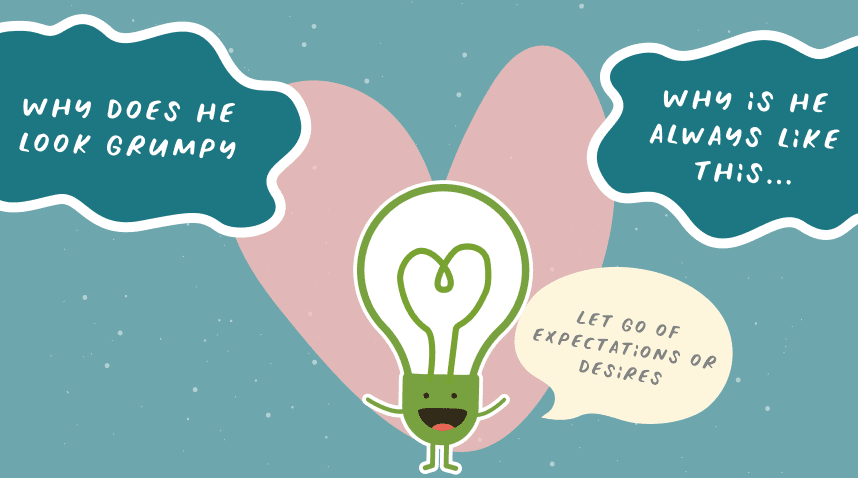Editor: This is a two-part series of Dhamma and marriage where Ai En shares her turnaround in her marriage. You can read the first article on how a monk saved her marriage here.
TLDR: I always thought of suttas as always being serious and all about practice. Having dived deeper into them, I found some that were extremely helpful in becoming a better partner to my husband.
As a practising Buddhist, I have found that the teachings of the Buddha can be incredibly helpful in improving my marriage. In this article, I will be referencing specific suttas (Buddhist scriptures) to illustrate how the principles of Buddhism can be applied in the context of a marriage relationship. Of course, for non-married couples/partners, the same principles apply!
Buddhism teaches us about the concept of non-attachment. However, this does not mean that we should not care about or be invested in our partners, but rather that we should not cling to them in an unhealthy or obsessive way. Here are 4 suttas that you may find helpful for you and your partner!
Metta Matters

In the Metta (Loving-kindness) Sutta, the Buddha teaches us to cultivate loving-kindness and to let go of craving and aversion.
This is particularly relevant in a romantic relationship, where it is easy to become attached to certain expectations or desires that our partner may not be able to fulfil.
For example, expecting our partner to come home daily with a smile on their face or for them to be always saying ‘yes’ to our whims and fancies.
This perception of an ever-bright and smiling partner makes us love them more conditionally. We then easily fall into ill-will and agitation if they fail to fulfil that perception.
Letting go of these fixed, unrealistic projections and cultivating a sense of loving-kindness towards our partner can create a more harmonious and fulfilling relationship. We wish them to be well and happy without inserting our ‘self’ into it.
We are content with our effort in putting the conditions for their happiness in motion, whether happiness happens is beyond our control. This makes us less likely to say ‘I did this just for you to feel x way, why don’t you feel x about it?’
I must admit that it is a constant battle to love my partner unconditionally. However, being aware of unrealistic expectations that I might harbour in my mind is a great reminder to have metta no matter what.
“Contented and easily satisfied, Unburdened with duties and frugal in their ways.” – Metta Sutta
Not taking relationships for granted
Another important principle in Buddhism is the concept of impermanence. The Buddha taught that everything around us is subject to change, whether we like it or not. Our loved ones grow old and our friendships strengthen and weaken. Nothing is constant.
The Upajjhatthana Sutta, where Buddha teaches about the five recollections that we should develop, is a great daily practice which we can bring into our relationship.
- I am subject to aging and I have not gone beyond aging.
- I am subject to illness and I have not gone beyond illness.
- I am subject to death and I have not gone beyond death.
- I am subject to impermanence and I must be parted and separated from everyone and everything dear and agreeable to me
- I am the owner of my actions. I receive the results of my actions. Dukkha arises through my actions and I am associated to my actions. Whatever I do I will inherit.
I find point 4 most useful for my relationship as Buddha reminds us that separation from our loved ones is inevitable, hence we don’t hold tightly to anger/pain towards others.
“All beings that come and go, that pass away and undergo rebirth, must be parted and separated from everyone and everything dear and agreeable.” – Upajjhatthana Sutta
By recognising the impermanence of our relationship, we can be more compassionate and considerate towards our partner and work towards the mutual benefit of both individuals. Not going to bed angry with each other because tomorrow is not promised has been one way I keep my “grudge-holding” period with my loved ones extremely short.
By asking yourself ‘What if tonight’s the last time I say goodnight to my partner? What should I do?’, this thought knocks out our negativity and makes us focus on the present.
When we don’t take each other for granted, we have more space for forgiveness and willingness to do our best for one another.
Speech matters

The Buddha also emphasised the importance of communication in creating healthy relationships. In the Vacasutta, the Buddha teaches about the importance of speaking at the right time, truthfully, affectionately, beneficially, and with a mind of goodwill.
In a relationship, it is essential to be open and honest with our partner and to communicate our needs and feelings in a kind and respectful way. This sutta’s notion of ‘timely’ pointed out the flaws in my communication style. I usually delivered ‘feedback’ or spoke about the challenging behaviours of my husband after his long day of work.
Yes, I did it affectionately, truthfully, beneficially and with a mind of good-will. But it was at the wrong time. This often led to me lamenting how my ‘good’ advice fell on deaf ears. This sutta helped me realise that timeliness was super important.
This often means holding back our comments until the issue is resolved. I have now learned to talk about the challenges in our relationship on weekends when we are both more well-rested and willing and emotionally available to listen.
By practising good communication, we can create a strong foundation for our relationship and avoid misunderstandings and conflicts.
One of the most challenging aspects of a marriage relationship can be dealing with conflict. The Buddha recognised that conflict is a natural part of any relationship and taught about the importance of resolving conflicts in a peaceful and harmonious way.
“It is spoken at the right time. It is spoken in truth. It is spoken affectionately. It is spoken beneficially. It is spoken with a mind of good-will.” -Vacasutta
Seeing the good even on the toughest days

In the Dutiyaāghātapaṭivinayasutta Sutta, the Buddha advises us on dealing with people we resent. By practising this attitude of openness to compromise and seeing the good in our partners, we can more effectively navigate conflicts in our relationships.
The Buddha dives deeper into how we can deal with our resentment depending on the type of personality that we face. In relationships, our partners are constantly changing in mind-states just like us. Some days our partner can say really mean things to us that can lead to resentment.
For example, they can be really kind in their actions but unskillful in their speech on a bad day. The Buddha uses the analogy of drinking from a pond filled with moss and aquatic plants. One sweeps away the moss and other plants to drink from the pond.
We ignore a person’s unskillful behaviour and focus on their skilful behaviour. We separate a negative act from the actor, allowing us space to return kindness even when it is difficult.
“How should you get rid of resentment for a person whose behaviour by way of speech is impure, but whose behaviour by way of body is pure? Suppose there was a lotus pond covered with moss and aquatic plants. Then along comes a person struggling in the oppressive heat, weary, thirsty, and parched. They’d plunge into the lotus pond, sweep apart the moss and aquatic plants, drink from their cupped hands, and be on their way. In the same way, at that time you should ignore that person’s impure behaviour by way of speech and focus on their pure behaviour by way of the body. That’s how to get rid of resentment for that person.” – Dutiyaāghātapaṭivinayasutta
Conclusion
In conclusion, the principles of Buddhism can be incredibly helpful in improving a relationship, by practising non-attachment, recognising the ephemeral nature of our relationship, engaging in honest and kind communication, and seeing the good of others in a peaceful manner.
By incorporating these teachings into our daily lives, we can create a strong foundation for a lifetime of happiness and joy in our marriage.
Wise Steps:
- Know which sutta can help in your relationship and memorise it! You never know when you might need it
- Life is uncertain. Taking your partner for granted can lead to many unnecessary regrets!


